Seminar Program “Social studies of debt and financial technologies in Chile”.

Date:Wednesday, September 27, 2023. Venue: Research and Postgraduate Research Institute, School of Economics, Government and Communications, Universidad Central. Santa Isabel 1278, Room 67, VKII building. Organizers: Felipe González (Universidad Central de Chile) & José Ossandón (Copenhagen Business School). Event developed in the context of a collaboration between the Max Planck – UCEN Group for Research in Economics and Society and the project “Post-pandemic Poverty: Debt and the Feminisation of Finance in Marginal Sites”, funded by the Independent Research Fund Denmark. Program and abstracts Registration here. Program 8.30 Welcome coffee 9.00 – 10:30. First session – And what else can I do? If you can no longer spend less. Strategies of middle-income households in Chile to cope with inflation. Lorena Pérez Roa (Social Work, Universidad de Chile), Alejandro Marambio Tapia (Sociology, Universidad Católica del Maule) and Gabriela Azocar de la Cruz (Social Work, Universidad de Chile). – The debt of others: towards a sociological exploration of attitudes and perceptions about the use of credit from relationship networks and reference groups. Matías Gómez (Sociology P. Universidad Católica & Research Institute of Economics, Government and Communications, Universidad Central) 10:30 Coffee break 11:00 – 12:30. Second session – Financial oikonomization: the financial government and administration of the household. José Ossandón (Department of Organization, Copenhagen Business School), Joe Deville (Department of Organisation, Work and Technology and the Department of Sociology, Lancaster University), Jeanne Lazarus (Centre de sociologie des Organisations, Sciences-Po-CNRS), Mariana Luzzi (Escuela Interdisciplinaria de Altos Estudios Sociales, Universidad Nacional de San Martín, CONICET) (Presentation in Spanish) – Entrepreneurship as therapy: learning to fail and care through micro-entrepreneurship in Santiago, Chile. Piergiorgio Di Giminiani (Anthropology, P. Universidad Católica de Chile) and Constanza Quezada (Anthropology, Pontificia Universidad Católica de Chile) 12:30 Lunch 13:00 – 14:30. Third session – “Papito corazón”: exploring the economic disadvantages of being head of household of popular sectors in Santiago, Chile. Lorena Pérez Roa (Social Work, Universidad de Chile) and Rocío Gallardo (Social Work, Universidad de Chile). – Consumer credit and personal networks. Exploring the role of network socioeconomic heterogeneity in consumption and indebtedness. Felipe González (Grupo Max Planck – UCEN de Investigación en Economía y Sociedad, Instituto de Investigación de Economía, Gobierno y Comunicaciones, Universidad Central), Gabriel Otero (Grupo Max Planck – UCEN de Investigación en Economía y Sociedad, Instituto de Investigación de Economía, Gobierno y Comunicaciones, Universidad Central), Matías Gómez ((Grupo Max Planck – UCEN de Investigación en Economía y Sociedad, Instituto de Investigación de Economía, Gobierno y Comunicaciones, Universidad Central & Sociología, P. Universidad Católica). 15:00 Closing and social activity
Gender autonomy nucleus directed by ESOC researcher held first seminar
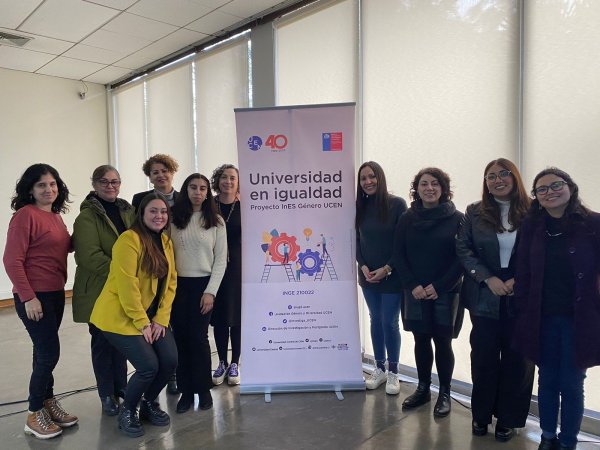
Last week was held the first seminar of the Gender Autonomies Nucleus of the Central University (NIAG), which is directed and integrated respectively by Paz Concha and Gabriela Zapata, both from the Max Planck-UCentral group and the research and postgraduate institute of the Faculty of Economics, Government and Communications; it is also integrated by Neida Colmenares, academic of that faculty, and Marcela Betancourt, who is part of the Faculty of Social Sciences of the University of Chile. The seminar was well attended by undergraduate and graduate students from Universidad Central along with researchers. The topics were organized into four roundtables: “Economic life and gender: studies of employment, care and trajectories”, “Migrations, mobilities and gender”, “Gender and intergenerational relations: youth and aging” and finally “Emerging challenges in gender studies”. The educational consequences of early detection of autism and its characteristics were discussed. In addition, on the suicide of young people as a human rights issue. in South Korea and Chile, analyzing their main similarities and differences. It also analyzed the symbolic universe of Chilean television commercials and how they develop gender equality in their contents, between 2019 and 2021, among many other topics, always under a gender perspective or as an axis of analysis. A large number of research papers, thesis projects or final research results for degrees and diplomas were registered among the exhibits. From a third-year psychology student to a doctoral student in law, about 40% of the presentations were in the hands of Central U. students. The main objective of the NIAG is the creation of knowledge in a collaborative and interdisciplinary manner and the seminar was a space where progress was made towards this goal. Now, a next seminar is planned, with presentations by people from outside the university, in order to continue promoting cooperation in the creation of knowledge. Stay tuned to the networks to learn more about the core and actions of “Universidad en Igualdad”.
Researcher Paz Concha participated in the launching of the book “Corporality and Mobility”.
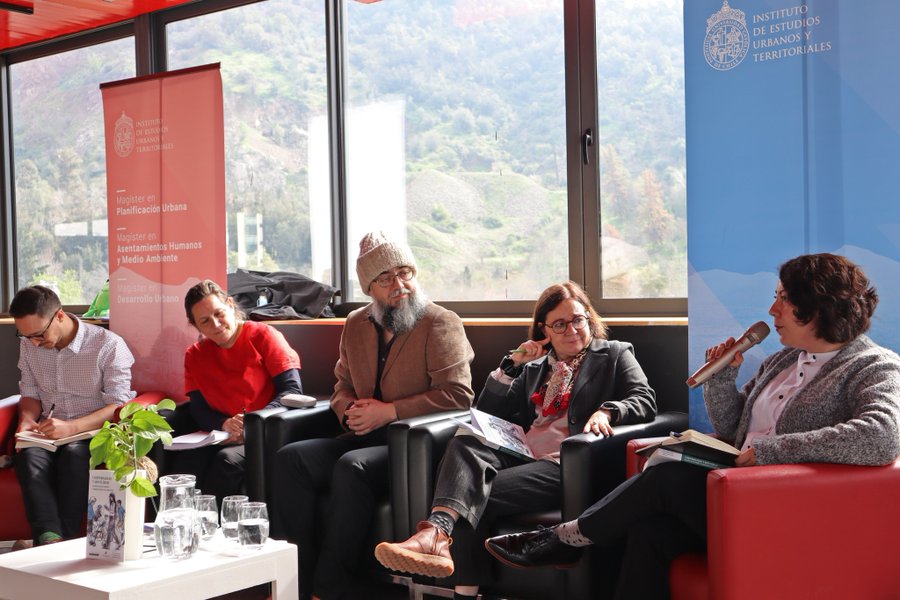
The book “Corporality and Mobility”, edited by Daniel Muñoz, researcher at the Housing Institute of the University of Chile; Gerardo Mora, UC Design academic; and ESOC member, Paz Concha, was launched at the UC Institute of Urban and Territorial Studies. The book, which aims to study everyday mobility from the role of the body in this process, was born under the auspices of the Research Network on Body and Mobility (RICMO), which seeks to consolidate the relationship between the study of the body and everyday mobility as a line of research with a more qualitative approach. In the work, published in the collection Estudios Urbanos UC and RIL Editores, 13 authors participated and analyzed various topics related to daily mobility. It is divided into three sections: one of more conceptual reflections; another of description of daily mobility practices; and a third part on methodological elements that can be useful to understand this process of daily mobility from the body. “I am co-author of three chapters that would come to be the introduction; a chapter with Francisca Avilés based on my postdoctoral research and that is about moving in atmospheres, it is called ‘Experience of change and transition in Santiago markets’; one with Cristóbal Vergara who was my master’s student when I was teaching at the UC,” explains Concha. The book received support from the UC Institute of Urban Studies, the COES center, the Movyt Millennium Nucleus and the UC School of Design.
UCEN-COES Winter School has already started

With a packed room 68, the UCEN-COES Winter School for early stage researchers began, an initiative jointly organized by the Research and Postgraduate Institute of the Faculty of Economics, Government and Communications (FEGOC) and the Center for the Study of Conflict and Social Cohesion (COES). Felipe González, director of the institute and of the Max Planck-UCentral Group, commented that “we have been working systematically to promote research, constituting a great team that not only researches individually, but also develops collective knowledge with an academic community in mind”. Meanwhile, Ignacio Cáceres, executive director of COES, said at the inauguration that “for us this is an instance of training, exchange and generation of super important networks (…) Take care of it and help to strengthen it and enjoy it”. The activity, promoted by COES and UCEN researchers, Paz Concha and Gabriel Otero, and COES and the Social Sciences and Youth Research Center (CISJU) of the Catholic University Silva Henríquez, Carolina Ramírez, was organized in collaboration with the following researchersIts focus is to promote the formation of transversal skills for insertion in the academy. The School is being held this week at Universidad Central, in the Vicente Kovacevic II building, 1278 Santa Isabel Avenue, in a hybrid format.
Researcher Marcos Gonzalez presented his book “UNCOMFORTABLY OFF. Why the Top 10% of Earners Should Care about Inequality”.
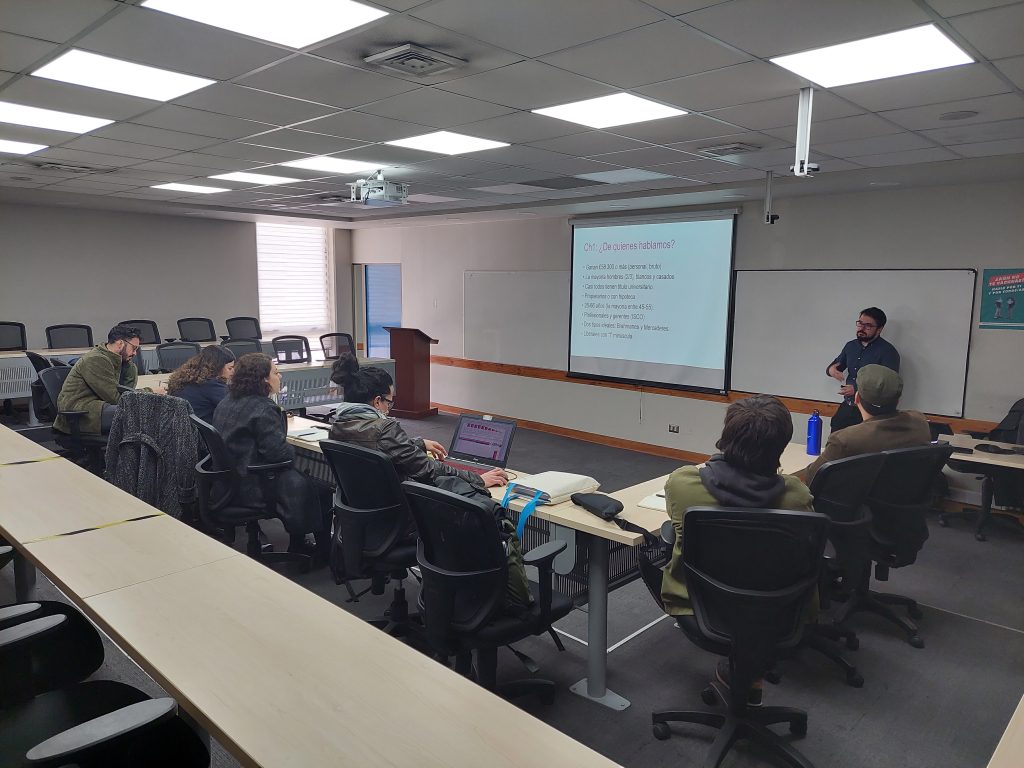
“UNCOMFORTABLY OFF. Why the Top 10% of Earners Should Care about Inequality 10% of Earners Should Care about Inequality.”was the book that was presented a few days ago in an activity organized by the Research and Postgraduate Institute of the Faculty of Economics, Government and Communications, and its ESOC Max Planck-UCentral group. The event was led by Marcos González, academic and researcher at the UCL Social Research Institute, Universidad Diego Portales and COES, and one of the authors -together with Gerry Mitchell- of the book published by Bristol University Press. The book offers a detailed qualitative work on inequality beyond the analysis of the top 1% of society to cover the top 10% and look at their social and political perceptions. One of the points made by González was that “an important difference in Europe is that the vision they have of poverty, for example, in Spain, if you ask them about the causes, they were quite fatalistic and gave rather structural answers”. The researcher also stressed that “stop thinking that 10% is so different from 90%, take a pause.”The company said that one element to consider is that it should “bring people with high incomes closer to policies that would benefit everyone and over time inequality within that decile will be seen more and more as inequality within society”.
Members of the Max Planck Group-UCentral participated in international conference

“Socio-Economics in a Transitioning World: Breaking Lines and Alternative Paradigms for a New World Order.” was the title of this year’s conference convened by the Society for the Advancement of Socio-Economics (SASE) and held July 20-22 in Rio de Janeiro, Brazil. Members of the Research and Postgraduate Institute of the Faculty of Economics, Government and Communications, who are also part of the Max Planck-UCentral Group, participated in the event and presented their main work. Felipe González, director of the institute and the group, highlights the work of SASE and the conference, explaining that it seeks to study economics beyond mathematical modeling and adding social perspectives. “He brings together political scientists, economists, sociologists, anthropologists; he always focuses on political economy and is interested in topics such as markets, finance, entrepreneurs, comparative capitalist systems, among others,” he adds. He comments that it is important to participate in the event because “there is no better academic space to discuss the research that we are producing from the line of economics and society, and also political studies. The convergence is perfect, this is the community that we want to read us, our articles, to comment on us. These are the magazines in which the group publishes, in fact.” Along these lines, he says that the team submitted eight original research articles, all of which were accepted, which were the ones that they presented and that We take advantage of the opportunity to network with other research centers in Europe, the United States, and Latin America,” he said.with whom we are going to make or are designing agreements for the doctoral program we are going to take in Advanced Social Studies. These agreements will allow us to manage the academic mobility of future students, but also of our academics and those from other institutions who will be able to come to the university.
Researcher Ignacio Schiappacasse presented before the Constitutional Council

Ignacio Schiappacase, a researcher from the School of Economics, Government and Communications, gave a presentation on social security to the Economic, Social, Cultural and Environmental Rights Commission of the Constitutional Council on Tuesday. The academic, who is a member of the faculty’s Research and Postgraduate Institute and the Max Planck-UCentral Group, referred to the amendment 215 of Chile Vamos and Republicans along with addressing how the AFP system works in Chile. The expert pointed out that the amendment presented by the opposition is problematic in that it indicates that “The State must respect the right of contributors to choose freely”, for example, in addition to giving constitutional rank to guaranteeing property and its inheritability. “It is problematic because it closes the debate, it gives constitutional status to the AFP system, which is already a worldwide rarity,” he said. “We need to be constantly adapting our pension system on an ongoing basis. (…) The wording is problematic and it opens the door to the pension system’s de-funding because it allows us, the members, to freely choose who manages (…) This amendment, as well as this one, opens the door for us to decide to take the funds out of the AFPs and make an investment to make those resources work”, he added. “It gives constitutional rank to aspects that have nothing to do with the international and accepted conception of social security,” he commented. Check out his speech at the Constitutional Council here .
Scholar Katherine Jensen presented her book “The Color of Asylum. The Racial Politics of Safe Haven in Brazil”.

VKII room 68 was the place where Katherine Jensen, assistant professor of Sociology and International Studies at the University of Wisconsin-Madison, presented her book “The Color of Asylum. The Racial Politics of Safe Haven in Brazil“(“The Color of Asylum: The Racial Politics of Secure Refuge in Brazil”) to be published in September by the University of Chicago Press. The paper proposes an ethnography of refugee experiences in Latin America’s largest country: it focuses on exploring testimonies of Syrian citizens who fled the war to Brazil, giving way to the need to create an open-door policy. During the activity, Jensen commented on some of the stories that make up the book and the reasons for the exodus. Thus, in the case of one of the testimonies, the departure from Syria was “because of the conflict, the government, fear of the consequences, and also the military service to be done in the country”. The expert pointed to racial differences in the processes of applying for and also receiving refugee status because “the experience of obtaining asylum is very different for black and white refugees in Brazil, which leads them to feel very different about the country and its policies. “Racial discrimination of migrants and refugees is seen as intimately linked to their legal and territorial exclusion. This means that racism is sought and indicated in how the State turns migrants into someone without rights, someone to be excluded,” he explained. Jensen holds a PhD in sociology from the University of Texas at Austin in 2018, with a minor in African and African diaspora studies. She has completed postdoctoral fellowships at Tulane University’s Inter-American Policy and Research Center, was a Fullbright Scholar in Brazil. His work has been published in academic journals such as “Ethnic and Racial Studies”, “Qualitative Sociology”, “American Behavioral Scientist”, “Social Currents”, “City & Community”, and “Contexts”, along with book chapters from various university publishers. As an ethnographer, her research interests include race/racism, refugees and immigration, political sociology and forced migration in the Americas, with a focus on Brazil and the Southern Cone.
The Spanish presentation of the book “UNCOMFORTABLY OFF. Why the Top 10% of Earners Should Care about Inequality.”
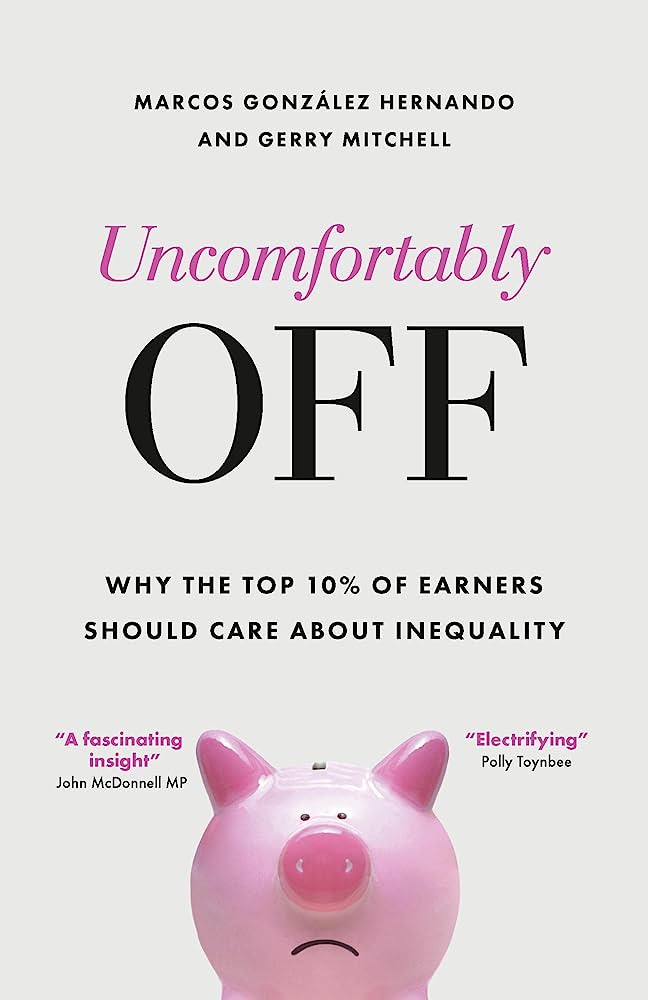
Room 68 of VKII will be the meeting point for the presentation in Spanish of the book “UNCOMFORTABLY OFF. Why the Top 10% of Earners Should Care about Inequality.”written by researchers Marcos Gonzalez and Gerry Mitchell and published by Bristol University Press. The book offers a detailed qualitative work that expands the focus of research on inequality beyond the analysis of the top 1% of society to the top 10% and looks at their social and political perceptions. In charge of the presentation will be Marco Gonzalez, academic and researcher at UCL Social Research Institute, Universidad Diego Portales and COES. Registration link here.
Next Thursday, July 13, there will be the Spanish presentation of the book “The Color of Asylum. The Racial Politics of Safe Haven in Brazil” will be presented in Spanish.
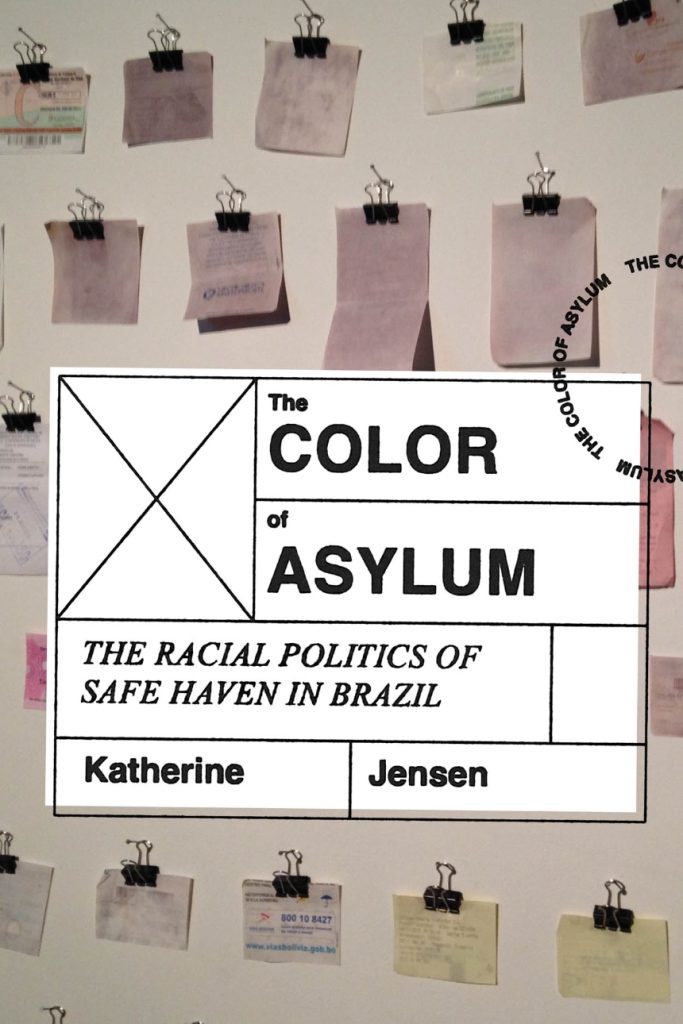
Next Thursday, July 13, at 5:00 p.m., the presentation in Spanish of the book “El libro “The Color of Asylum. The Racial Politics of Safe Haven in Brazil (“The Color of Asylum: The Racial Politics of Safe Refuge in Brazil”) published by the University of Chicago Press and written by Professor Katherine Jensen, who will discuss the main details. Registration link here. The work elaborates an ethnography of the difficult experiences of refugees in Brazil. In 2013, when the millions of Syrian citizens were desperately fleeing a brutal war, the Latin American country took the step of instituting an open-door policy for all those refugees. In the book, Jensen offers an ethnographic look at the asylum-seeking process in Brazil, documenting in detail the various forms of treatment of asylum seekers, and evidencing its underlying racial logic. The analysis focuses on Syrian and Congolese refugees, two of the largest and most successful groups in asylum processing. Although both groups have more or less equivalent rates of obtaining asylum, the transition to asylum status could not be more different: both at the moment of entry into the country and in the subsequent stages, Brazilian officials impose significantly greater difficulties on Congolese refugees. Meanwhile, Syrian refugees are subject to better treatment given their recognition as white migrants by the Brazilian state, in a nation that has historically privileged white immigration. And yet, regardless of their country of origin, both groups of migrants, including those who manage to obtain asylum status, find their lives remain extremely difficult, marked by struggle and discrimination. Jensen is an assistant professor of Sociology and International Studies at the University of Wisconsin-Madison. She earned her PhD in sociology from the University of Texas at Austin in 2018, with a minor in African and African Diaspora Studies. Prior to joining the University of Wisconsin, he completed postdoctoral fellowships at Tulane University’s Center for Inter-American Policy and Research. She was also a Fullbright scholar in Brazil. As an ethnographer, her research interests include race/racism, refugees and immigration, political sociology and forced migration in the Americas, with a focus on Brazil and the Southern Cone. His work has been published in various academic journals such as “Ethnic and Racial Studies”, “Qualitative Sociology”, “American Behavioral Scientist”, “Social Currents”, “City & Community”, and “Contexts”, as well as in book chapters from various university publishers. The activity is convened by the Faculty of Economics, Government and Communications and organized by the Max-Planck – UCentral Group in Economics and Society, and will be held in the Vicente Kovacevic II building, Santa Isabel 1278, in room 68. Registration link here.